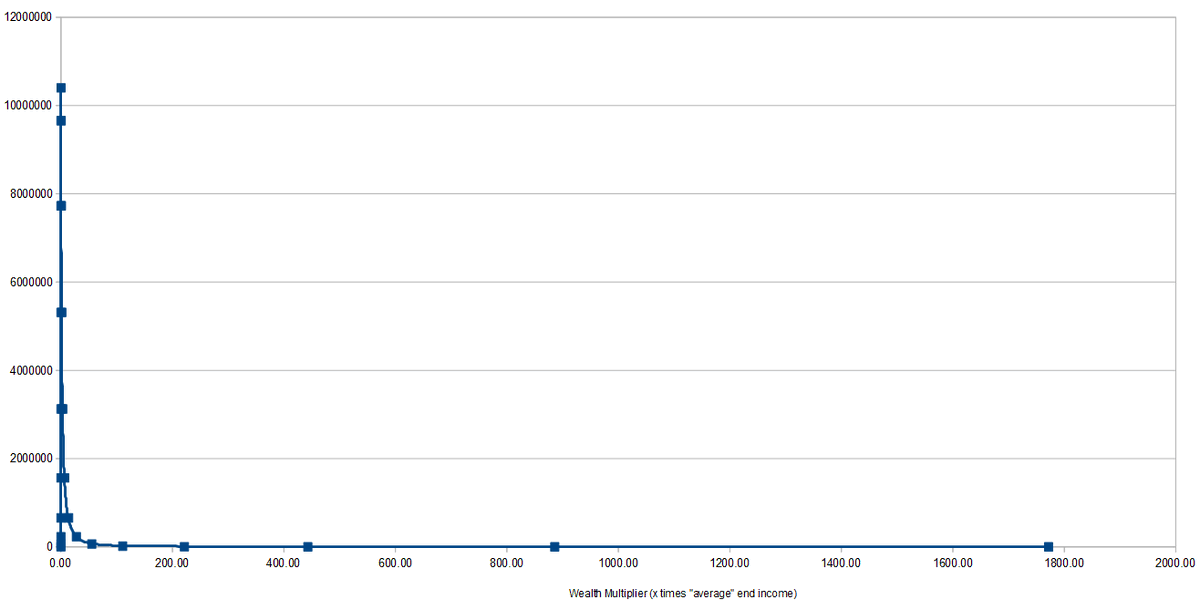
Contextual blindness - the tendency for members of the privileged to think that something other than luck was responsible for their position and privilege ->
https://twitter.com/indiyoung/status/1338623809939779584
X : Why random?
Me : Take 66M people. Give them each £1. Each year they toss a coin. Heads your wealth increases 40%. Tails your wealth reduces 30%. Overall, wealth grows ... but ... after 26 years, by pure random luck, 4% of the people will own almost 50% of the wealth ...
Me : Take 66M people. Give them each £1. Each year they toss a coin. Heads your wealth increases 40%. Tails your wealth reduces 30%. Overall, wealth grows ... but ... after 26 years, by pure random luck, 4% of the people will own almost 50% of the wealth ...
... the top 0.1% will own more wealth than the bottom 50% ... it's just pure random luck, tossing coins. You'd have mass inequality. The wealthiest will have 7,000x the wealth of the average. No talent involved.
X : And your point?
Me : This level of inequality exists by pure luck within a "fair" system, let alone one that's rigged i.e. return on capital increases with capital. Talent, skill and "meritocracy" have almost nothing to do with privilege. They are simply how we "justify" it.
Me : This level of inequality exists by pure luck within a "fair" system, let alone one that's rigged i.e. return on capital increases with capital. Talent, skill and "meritocracy" have almost nothing to do with privilege. They are simply how we "justify" it.
Anyway, this is a fabulous paper - The ergodicity problem in economics - nature.com/articles/s4156… ... well worth the read.
Trust a physicist to come along and point at the 350 year old glaring flaw that is screaming "hey, I'm an obvious flaw" in the dismal science. Well done @ole_b_peters. Marvellous paper.
X : But everyone earns more?
Me : In the above? Sure, the averages goes from £1 per person to £3.55
X : So wealth increases!
Me : Except 70% will find themselves in relative poverty (<50% of average) and the top earner will have the wealth of the bottom 400,000 people ...
Me : In the above? Sure, the averages goes from £1 per person to £3.55
X : So wealth increases!
Me : Except 70% will find themselves in relative poverty (<50% of average) and the top earner will have the wealth of the bottom 400,000 people ...
... don't underestimate the power of luck to create a highly distorted and unequal society. Just add in information asymmetry plus return on capital being proportional to capital plus inheritance plus class boundaries to distort the system even further.
X : But if people work harder then ...
Me : ... it'll make no difference. You really don't get this luck bit and the systems of privilege we've created do you? If left unchecked, the entire system will become unstable. Why do you think China is going to attack this space?
Me : ... it'll make no difference. You really don't get this luck bit and the systems of privilege we've created do you? If left unchecked, the entire system will become unstable. Why do you think China is going to attack this space?
X : What would make a more effective system?
Me : Do you want a more vibrant, thriving economy?
X : Yes.
Me : I'd suggest a universal basic income funded through wealth taxes.
Me : Do you want a more vibrant, thriving economy?
X : Yes.
Me : I'd suggest a universal basic income funded through wealth taxes.
X : That would create a disincentive to ...
Me : ... you really don't get the role of luck and the systems of privilege. Until you realise that we don't live in a meritocracy - that's just want we write on the "society" marketing brochure - then we will not be able to fix this.
Me : ... you really don't get the role of luck and the systems of privilege. Until you realise that we don't live in a meritocracy - that's just want we write on the "society" marketing brochure - then we will not be able to fix this.
X : A 40% return, a 30% loss mean 1.4*0.7 = 0.98 ... a loss overall?
Me : Pascal's triangle.
Head (H) and Tail (T)
Hence HH + HT + TH + TT =
1.96 + 2(0.98) + 0.49 = 1.10 average.
That "10%" average gain hides the massive distortion i.e. 3 people lose, one gains large.
Me : Pascal's triangle.
Head (H) and Tail (T)
Hence HH + HT + TH + TT =
1.96 + 2(0.98) + 0.49 = 1.10 average.
That "10%" average gain hides the massive distortion i.e. 3 people lose, one gains large.
X : How can this be the case if wealth has increased?
Me : Distribution. Just run the numbers with 66M people, it's a five minute exercise. Yes, wealth average goes up 3.5x but look at the distribution of this ... 70% end up in relative poverty.
Me : Distribution. Just run the numbers with 66M people, it's a five minute exercise. Yes, wealth average goes up 3.5x but look at the distribution of this ... 70% end up in relative poverty.

It's no different with the modelling I used to do with jumping genes (long ago) and how randomness can lead to dominance of a gene (with no immediate function) in a population.
• • •
Missing some Tweet in this thread? You can try to
force a refresh


